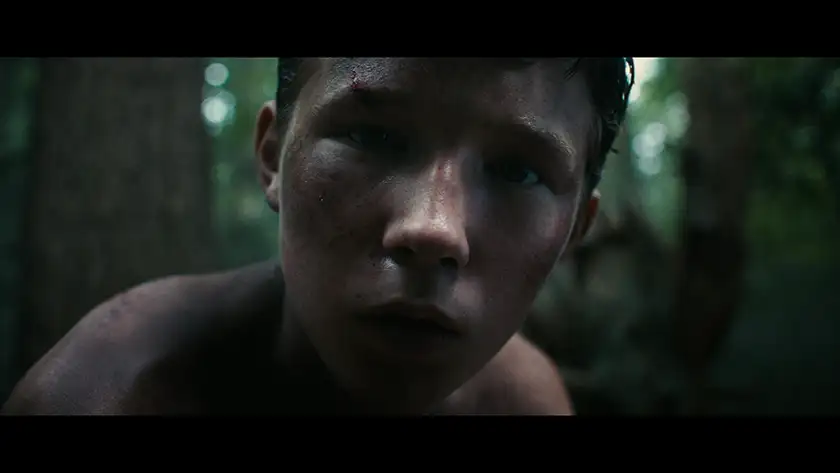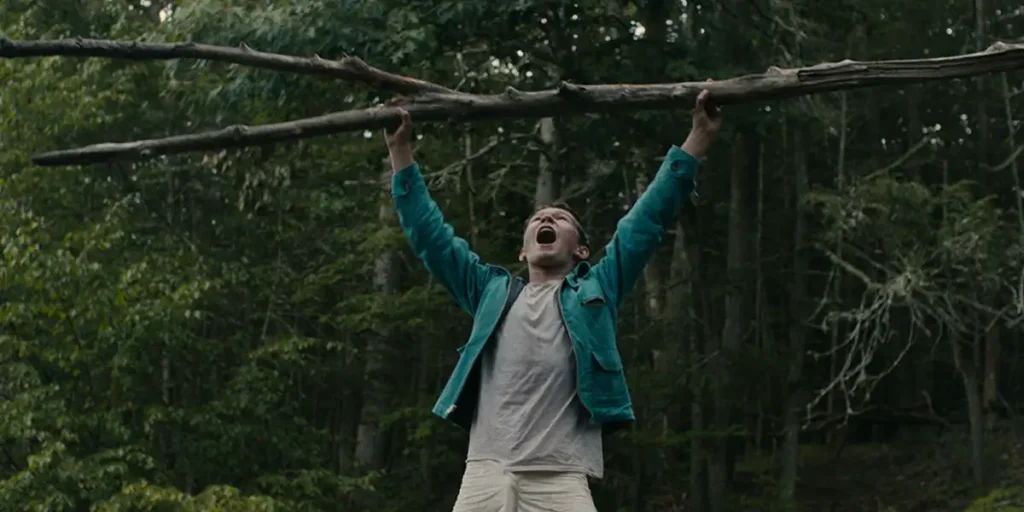Lost on a Mountain in Maine is best when it breaks away from predictable drama tropes. Outstanding performances from Blumm and Sparks make this film stand out.
Director: Andrew Boodhoo Kightlinger
Genre: Adventure, Family, Drama
Run Time: 98′
U.S. Release: November 1, 2024
U.K. Release: TBA
Where to Watch: in US theaters
What does it mean to be a man? This question underscores Andrew Kightlinger’s Lost on a Mountain in Maine, produced by Sylvester Stallone (of Rocky). The film is based on the true story of the nine-day hunt for Donn Fendler (Luke David Blumm) in a harrowing northeastern mountain range. In 1939, twelve-year-old Donn and his brother, Ryan (Griffin Wallace Henkel), set out on a hike with their father Donald (Paul Sparks).
The opening sequence preceding the hike sets the table for the family’s traditional dynamic: a father demanding respect, and two sons who balance their wild boyhood with forced manners and proper behavior. This is reminiscent of Terrence Malick’s The Tree of Life in its representation of often harsh expectations of masculinity and their toxic results.
This is almost more interesting than the main storyline of Donn navigating the woods alone. The majority of the film focuses on his resilience and unexpected survival under frightful circumstances, but the tension alluded to earlier is not as primary in the second act. Though the beginning sets up a thrilling story, its later execution is rather inspirational and emotional.
Blumm’s performance is superb, as he portrays freedom and a propensity for survival distinct to his young outlook on the world. Though he’s alone in the wooded highlands for nine days, he dances in rivers and catches his own food. The tension, then, is mainly depicted in his parents’ worried search for him. Jumping between these two perspectives highlights just how uplifting the true story is. Donn never gives up, and his parents assemble one of the largest search parties in history to find him. It’s a testament to the power of a family and community coming together for a shared cause.

Cinematographer Idan Menin uses establishing shots and long takes to capture the beauty and terror of nature. There are many sprawling shots of mountain ranges and closeups of nature’s inner workings. If not for moments of folklore and fantasy, these would feel redundant. In one visually striking scene, Donn encounters a creature from campfire stories he’s heard. This is perfectly executed, combining the best parts of the film. Lost on a Mountain in Maine successfully utilizes inspiration, drama, and folklore to keep viewers guessing about the movie’s next steps. The premise that the boy survives is quite predictable, but there is plenty to make it more than a mere inspirational family drama.
Interestingly, the film includes real-life interview footage of those involved in the search for Donn. While this bolsters the hopeful ending toward which the story journeys, it is used too generously. Opening and ending with such footage is good, but randomly cutting to it in the middle of the movie pulls the viewer out of the primary setting and story. Perhaps more footage could have been included as the credits rolled to avoid this.
Lost on a Mountain in Maine is at its best when it breaks away from predictable drama tropes. Its commentary on masculinity, family, and community is subtle yet powerful, and its fantastical moments showcase exemplary filmmaking. Outstanding performances from Blumm and Sparks make this unique, though somewhat flawed inspirational drama stand out among the rest.
Lost on a Mountain in Maine will be released in US theaters on November 1, 2024.

